- Home
- Robert E. Howard
A Thunder of Trumpets
A Thunder of Trumpets Read online
Table of Contents
COPYRIGHT INFORMATION
ALSO BY ROBERT E. HOWARD
INTRODUCTION, by Mark Finn
PIGEONS FROM HELL
THE LAST HOUR
SHIPS
LINES WRITTEN IN THE REALIZATION THAT I MUST DIE
A THUNDER OF TRUMPETS
RECOMPENSE
THE GHOST KINGS
THE KING AND THE OAK
DESERT DAWN
ALMURIC
THE HILLS OF KANDAHAR
SONG AT MIDNIGHT
THE WITCH FROM HELL’S KITCHEN
BUT THE HILLS WERE ANCIENT THEN
THE ONE BLACK STAIN
A THUNDER OF TRUMPETS
ROBERT E. HOWARD
EDITED BY PAUL HERMAN
INTRODUCTION BY MARK FINN
COPYRIGHT INFORMATION
Copyright © 2010 by Paul Herman.
Introduction © 2010 by Mark Finn.
Cover art copyright © 2010 by Stephen Fabian.
All rights reserved.
Published by Wildside Press LLC
www.wildsidebooks.com
ALSO BY ROBERT E. HOWARD
The Complete Action Stories
Gates of Empire
A Gent from Bear Creek and Others
Treasures of Tartary
Graveyard Rats and Others
Waterfront Fists and Others
THE WEIRD WORKS OF ROBERT E. HOWARD
Shadow Kingdoms
Moon of Skulls
People of the Dark
Wings in the Night
Valley of the Worm
Gardens of Fear
Beyond the Black River
Hours of the Dragon
Black Hounds of Death
A Thunder of Trumpets
INTRODUCTION, by Mark Finn
THE FIRE REMAINS
No author ever really dies; not so long as his work continues to be read and enjoyed by others. This is especially true when new stories and poems continue to come to light and rekindle the flames of interest. Such was the case in 1936. Weird Tales was still a going concern and steadily working through their backlog of Robert E. Howard stories and poems, some of which were bought over a year before the author’s death. Farnsworth Wright had, incidentally, begun to pay down on the significant amount of money he owed Howard (checks paid to his father, who continued to employ Otis Adelbert Kline as agent for his son’s literary estate). Kline sold several stories to various magazines from the literal stacks of unpublished Howard works, and later Oscar Friend did likewise.
It is through these people’s efforts and the entrenched caches of Howard’s then-unpublished work that account for the stories and poetry found in this volume. We know that some manuscripts were specifically intended to be sent out, as per Howard’s written instructions, by Kline. As for the rest, well, that’s harder to say. But Kline was familiar enough with Howard’s work that he was able to spot unsold gems that he could place in various magazines, and he did just that with a fairly free hand.
While these stories and poems seem disparate by virtue of the fact that they are not part of a greater “cycle” of tales, there is no reason to think that they are inferior to Howard’s Conan or Cthulhu mythos tales. In fact, two of the best stories Howard ever wrote are contained in this final volume.
Of the horror story, “Pigeons from Hell,” much has been said and with good reason. It’s widely considered to be one of Howard’s best stories, period. It could have been written as early as 1933, but considering the source and the theme of the material in the tale, no one can say for certain. Why Howard sat on it for as long as he did is a much better question. But this story was part of the package intended for Weird Tales editor Farnsworth Wright that was found on Howard’s writing desk after his death. There was never any question that Wright wouldn’t have published this tale, regardless of Howard’s last wishes. It’s that good.
“Pigeons from Hell” is a dark southern gothic horror stories that grabs the reader right away and refuses to let go until the genuinely creepy ending. Howard scholar Brian Leno has surmised that the two protagonists in the story are thinly disguised versions of Howard himself and his pen pal H.P. Lovecraft, who scoffed at the Southern part of the country’s ability to summon any ghostly folklore that could rival New England’s. Readers may consider this to be Howard’s final word on that particular subject.
So much of Howard’s fictional output can be readily classified, or at least identified as a blend of genres and subject matter, but there are certain stories that seem to defy nomenclature of any kind. “A Thunder of Trumpets” is a great example of that. Whereas the subject matter was perfect for Weird Tales in 1938, it nevertheless takes a setting reminiscent of a Kipling story, a female protagonist, and a mysterious stranger who saves her from a tiger attack throws them into the tempest of Howard’s imagination. What Howard does with this mix is curious; it’s not his typical blood and thunder solution. This is a thoughtful and introspective story, and when framed in the language of Howard’s own relationship with Novalyne Price, very compelling.
In the annals of Howard fans, his lone sword-and-planet novel, Almuric, is something of a cult classic. Originally conceived as a novel for a British publisher, the story is famous for not having an ending—either Howard stopped abruptly, intending to return to it at a later time, or some pages got lost between 1934 and 1936. Howard scholar Morgan Holmes suggested that Otto Binder may have completed the last one and a half chapters of the novel to make it sellable. Despite the very un-Howard-like ending, the rest of the book is a fascinating look at how Howard approached a given subject and made it his own. We know he was a fan of Burroughs and doubtless read his fill, in addition to retaining Otis Kline as his agent, who also wrote sword-and-planet fiction in the Burroughs tradition. Here Howard takes all of those familiar trappings, compares them with Jack London’s “The Jacket” and then goes right out and does his own thing with it.
I called Almuric a cult classic because it’s either beloved or reviled, depending on who you talk to. Folks who go into it expecting a straight shot of John Carter of Mars are always disappointed. Instead, I would suggest that you look at the ways in which Howard shapes the familiar formula of sword-and-planet into a Howardian hymn of Hate.
The last story in this volume, “The Witch From Hell’s Kitchen,” is another head scratcher, particularly when you start reading the story and realize that you are in ancient Sumer! The original title, “The House of Arabu,” was apparently not sexy enough for contemporary readers, and so we got the name above instead. This is another easy to spot, but difficult to place, Howard story. Not a part of the “historical Oriental adventures” that Howard wrote, although there is some intrigue and derring do involved, nor is it a straightforward horror story, either. Because it’s a genre-bender, you don’t really know where this is one is going until you get to the end. Another neat trick of Howard’s.
It is very tempting to look upon some of the poetry left behind in the wake of Howard’s death and see great and meaningful things, particularly in the absence of a suicide note. “Lines Written in the Realization That I Must Die,” for example, practically begs the reader to read more into what was undoubtedly a poem written several years prior to 1936. In point of fact, it is difficult to avoid the subject of death and misanthropy that runs throughout much of Howard’s poetry that was written between 1921 and 1927. We find a young Robert E. Howard working in various odd jobs, clerking in stores, going through the motions of being interested in school, dealing with two oil booms (and even working for the men responsible for same), and in general wanting to write stories and being unable or unwilling to because of his job responsibilities. Who wouldn’t be
worn down by all of that? If Howard wasn’t condemning civilization in his verse, he was setting himself free from it—by boat, by air, or by embracing the void.
Howard’s poetry is powerful—sharp and vivid word pictures that deliver little stories in the briefest of glimpses. As an emotional release, we find in these verses Howard at his most elemental: saturated in one pure state of mind, writing with a razor-sharp pen. Every word is a cut, and in the end you will find yourself bleeding along with Howard.
“Recompense” is another noteworthy poem. Howard wrote it in answer to a published poem by a local poet, Lexie Dean Anderson. Howard must have felt that her version was a touch idyllic, and so he composed a version of his own, incorporating her structure, and then running roughshod over the subject matter.
While all of the poems in volume 10 are really fine examples of Howard at his best, “The King and the Oak” is a double doozy for one reason: the return of King Kull. About this, I will say no more, lest I give something away, but this poem is an interesting coda to what was thought to be (at the time) a mere two King Kull stories. Now we know that Howard wrote many more that weren’t accepted, but that he also wrote this poem, as well is worth noting. Not as long as “Solomon Kane’s Homecoming,” nor as storied, it nevertheless underscores the entire premise of the Kull stories in a single, telling incident.
Considering that these stories and poems represent what was thought to be the last of Robert E. Howard, it is a curious mix. In the remnants of the bonfire talent that was Howard, we are left with these scattered embers and coals. Some continue to burn brightly, and anew, while others throw a spark or explode with a sharp pop and then are gone from our view. That’s how it goes with fires, when you watch them burn down.
Except that in Howard’s case, someone always comes along and fans the flame, letting the fire breathe again and leap up to warm the room, throw a strange shadow on the wall, or simply hold the people watching the fire in a trance, sending their inner eyes off in a thousand different directions. Howard’s work is like that. It gets inside your head, and takes you around the world, back in time, and drags you by the nose through the vivid dreams of a young man who lived and died in a small Texas town, and in a little more than a decade, gave us over a thousand glimpses into his world, the way he saw it, through the veil of his own imagination. The one piece of poetry missing from this collection is the famous couplet found in his wallet, long since thought to be Howard’s final words to the world:
All fled, all done, so lift me on the pyre;
The feast is over and the lamps expire.
I have always taken exception to this. After all, are we not the stewards of Howard’s life and art? Don’t we, as friends and fans, pass his work around, and tell newcomers to “read this” and “you gotta try that?” We give his books as gifts to young nieces and nephews. We write reviews on the Internet, in our blogs, and wherever we can, to tell people how great Robert E. Howard was. His prose engages us, and we go out and engage others in the service to his prose. No, the lamps expire, but the fire remains.
—Mark Finn
Deep in North Texas
PIGEONS FROM HELL
Weird Tales, June 1936
1. The Whistler in the Dark
Griswell awoke suddenly, every nerve tingling with a premonition of imminent peril. He stared about wildly, unable at first to remember where he was, or what he was doing there. Moonlight filtered in through the dusty windows, and the great empty room with its lofty ceiling and gaping black fireplace was spectral and unfamiliar. Then as he emerged from the clinging cobwebs of his recent sleep, he remembered where he was and how he came to be there. He twisted his head and stared at his companion, sleeping on the floor near him. John Branner was but a vaguely bulking shape in the darkness that the moon scarcely grayed.
Griswell tried to remember what had awakened him. There was no sound in the house, no sound outside except the mournful hoot of an owl, far away in the piney woods. Now he had captured the illusive memory. It was a dream, a nightmare so filled with dim terror that it had frightened him awake. Recollection flooded back, vividly etching the abominable vision.
Or was it a dream? Certainly it must have been, but it had blended so curiously with recent actual events that it was difficult to know where reality left off and fantasy began.
Dreaming, he had seemed to relive his past few waking hours, in accurate detail. The dream had begun, abruptly, as he and John Branner came in sight of the house where they now lay. They had come rattling and bouncing over the stumpy, uneven old road that led through the pinelands, he and John Banner, wandering far afield from their New England home, in search of vacation pleasure. They had sighted the old house with its balustraded galleries rising amidst a wilderness of weeds and bushes, just as the sun was setting behind it. It dominated their fancy, rearing black and stark and gaunt against the low lurid rampart of sunset, barred by the black pines.
They were tired, sick of bumping and pounding all day over woodland roads. The old deserted house stimulated their imagination with its suggestion of antebellum splendor and ultimate decay. They left the automobile beside the rutty road, and as they went up the winding walk of crumbling bricks, almost lost in the tangle of rank growth, pigeons rose from the balustrades in a fluttering, feathery crowd and swept away with a low thunder of beating wings.
The oaken door sagged on broken hinges. Dust lay thick on the floor of the wide, dim hallway, on the broad steps of the stair that mounted up from the hall. They turned into a door opposite the landing, and entered a large room, empty, dusty, with cobwebs shining thickly in the corners. Dust lay thick over the ashes in the great fireplace.
They discussed gathering wood and building a fire, but decided against it. As the sun sank, darkness came quickly, the thick, black, absolute darkness of the pinelands. They knew that rattlesnakes and copperheads haunted Southern forests, and they did not care to go groping for firewood in the dark. They ate frugally from tins, then rolled in their blankets fully clad before the empty fireplace, and went instantly to sleep.
This, in part, was what Griswell had dreamed. He saw again the gaunt house looming stark against the crimson sunset; saw the flight of the pigeons as he and Branner came up the shattered walk. He saw the dim room in which they presently lay, and he saw the two forms that were himself and his companion, lying wrapped in their blankets on the dusty floor. Then from that point his dream altered subtly, passed out of the realm of the commonplace and became tinged with fear. He was looking into a vague, shadowy chamber, lit by the gray light of the moon which streamed in from some obscure source. For there was no window in that room. But in the gray light he saw three silent shapes that hung suspended in a row, and their stillness and their outlines woke chill horror in his soul. There was no sound, no word, but he sensed a Presence of fear and lunacy crouching in a dark corner. . . . Abruptly he was back in the dusty, high-ceilinged room, before the great fireplace.
He was lying in his blankets, staring tensely through the dim door and across the shadowy hall, to where a beam of moonlight fell across the balustraded stair, some seven steps up from the landing. And there was something on the stair, a bent, misshapen, shadowy thing that never moved fully into the beam of light. But a dim yellow blur that might have been a face was turned toward him, as if something crouched on the stair, regarding him and his companion. Fright crept chilly through his veins, and it was then that he awoke—if indeed he had been asleep.
He blinked his eyes. The beam of moonlight fell across the stair just as he had dreamed it did; but no figure lurked there. Yet his flesh still crawled from the fear the dream or vision had roused in him; his legs felt as if they had been plunged in ice water. He made an involuntary movement to awaken his companion, when a sudden sound paralyzed him.
It was the sound of whistling on the floor above. Eerie and sweet it rose, not carrying any tune, but piping shrill and melodious. Such a sound in a supposedly deserted house was alarming enough; but
it was more than the fear of a physical invader that held Griswell frozen. He could not himself have defined the horror that gripped him. But Branner’s blankets rustled, and Griswell saw he was sitting upright. His figure bulked dimly in the soft darkness, the head turned toward the stair as if the man were listening intently. More sweetly and more subtly evil rose that weird whistling.
“John!” whispered Griswell from dry lips. He had meant to shout—to tell Branner that there was somebody upstairs, somebody who could mean them no good; that they must leave the house at once. But his voice died dryly in his throat.
Branner had risen. His boots clumped on the floor as he moved toward the door. He stalked leisurely into the hall and made for the lower landing, merging with the shadows that clustered black about the stair.
Griswell lay incapable of movement, his mind a whirl of bewilderment. Who was that whistling upstairs? Why was Branner going up the stairs? Griswell saw him pass the spot where the moonlight rested, saw his head tilted back as if he were looking at something Griswell could not see, above and beyond the stair. But his face was like that of a sleepwalker. He moved across the bar of moonlight and vanished from Griswell’s view, even as the latter tried to shout to him to come back. A ghastly whisper was the only result of his effort.
The whistling sank to a lower note, died out. Griswell heard the stairs creaking under Branner’s measured tread. Now he had reached the hallway above, for Griswell heard the clump of his feet moving along it. Suddenly the footfalls halted, and the whole night seemed to hold its breath. Then an awful scream split the stillness, and Griswell started up, echoing the cry.
The strange paralysis that had held him was broken. He took a step toward the door, then checked himself. The footfalls were resumed. Branner was coming back. He was not running. The tread was even more deliberate and measured than before. Now the stairs began to creak again. A groping hand, moving along the balustrade, came into the bar of moonlight; then another, and a ghastly thrill went through Griswell as he saw that the other hand gripped a hatchet—a hatchet which dripped blackly. Was that Branner who was coming down that stair?

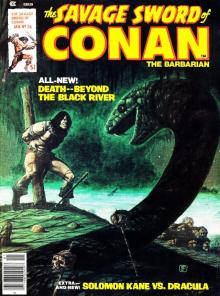 Beyond the Black River
Beyond the Black River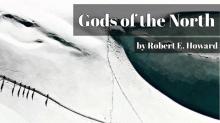 Gods of the North
Gods of the North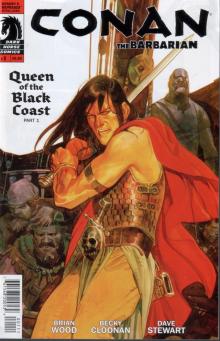 Queen of the Black Coast
Queen of the Black Coast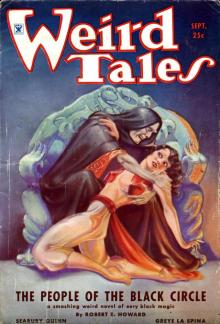 The People of the Black Circle
The People of the Black Circle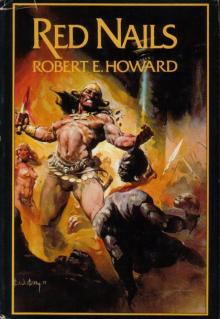 Red Nails
Red Nails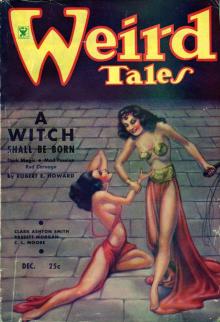 A Witch Shall Be Born
A Witch Shall Be Born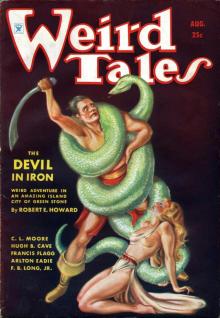 The Devil in Iron
The Devil in Iron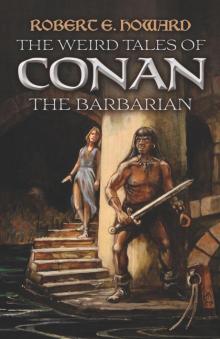 The Weird Tales of Conan the Barbarian
The Weird Tales of Conan the Barbarian The Bloody Crown of Conan
The Bloody Crown of Conan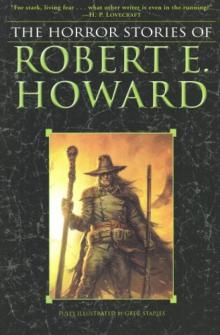 The Horror Stories of Robert E. Howard
The Horror Stories of Robert E. Howard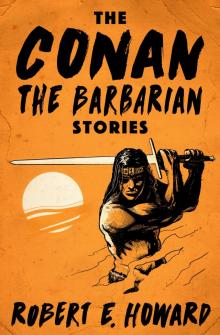 Conan the Conqueror
Conan the Conqueror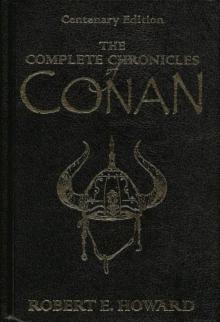 Conan the Barbarian
Conan the Barbarian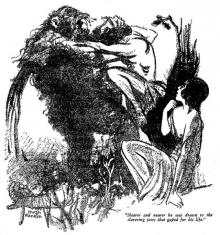 Shadows in the Moonlight
Shadows in the Moonlight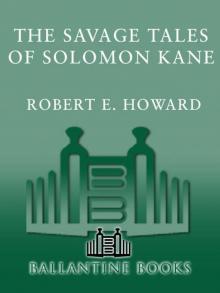 The Savage Tales of Solomon Kane
The Savage Tales of Solomon Kane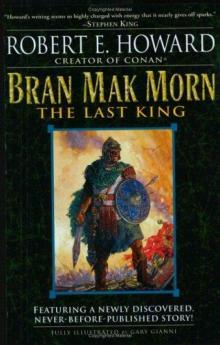 Bran Mak Morn: The Last King
Bran Mak Morn: The Last King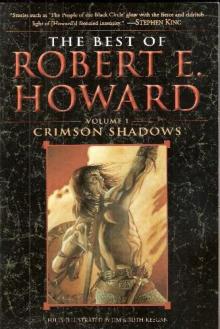 The Best of Robert E. Howard Volume One: Crimson Shadows
The Best of Robert E. Howard Volume One: Crimson Shadows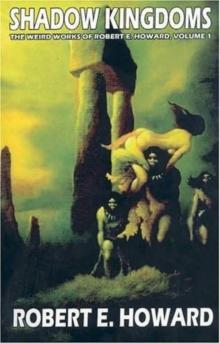 The Best of Robert E. Howard: Crimson Shadows (Volume 1)
The Best of Robert E. Howard: Crimson Shadows (Volume 1)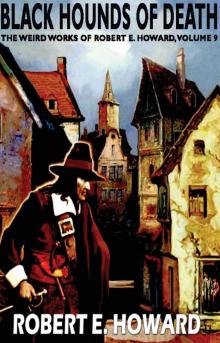 Black Hounds of Death
Black Hounds of Death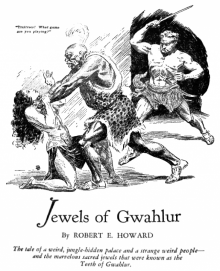 Jewels of Gwahlur
Jewels of Gwahlur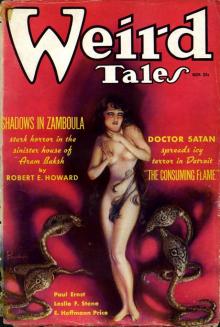 Shadows in Zamboula
Shadows in Zamboula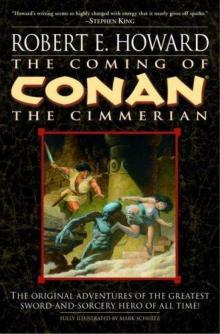 The Coming of Conan the Cimmerian
The Coming of Conan the Cimmerian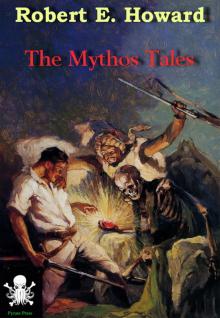 The Mythos Tales
The Mythos Tales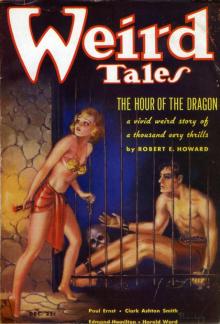 The Hour of the Dragon
The Hour of the Dragon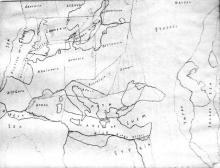 The Hyborian Age
The Hyborian Age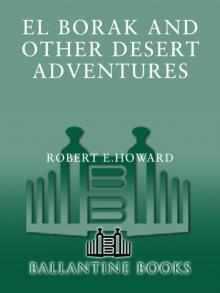 El Borak and Other Desert Adventures
El Borak and Other Desert Adventures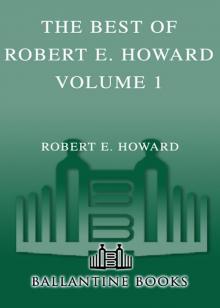 The Best of Robert E. Howard Volume 1 The Best of Robert E. Howard Volume 1
The Best of Robert E. Howard Volume 1 The Best of Robert E. Howard Volume 1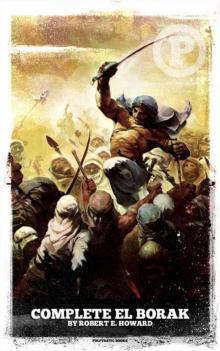 El Borak: The Complete Tales
El Borak: The Complete Tales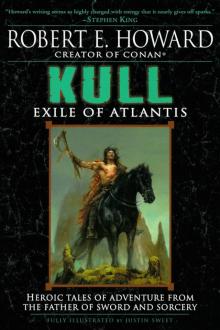 Kull: Exile of Atlantis
Kull: Exile of Atlantis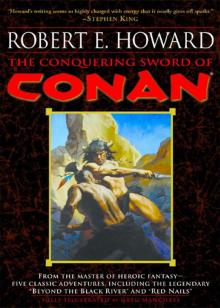 The Conquering Sword of Conan
The Conquering Sword of Conan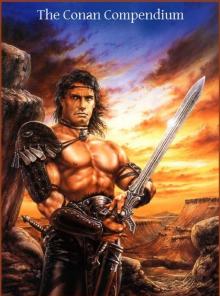 The Conan Compendium
The Conan Compendium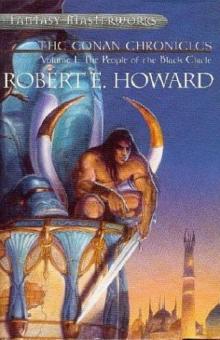 The Conan Chronicles: Volume 1: The People of the Black Circle
The Conan Chronicles: Volume 1: The People of the Black Circle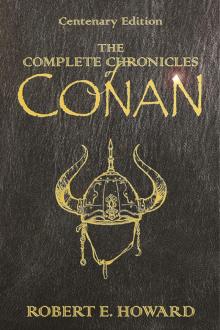 The Complete Chronicles of Conan: Centenary Edition
The Complete Chronicles of Conan: Centenary Edition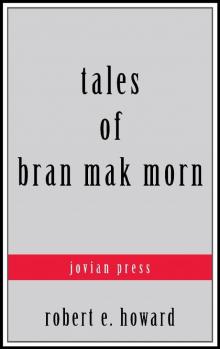 Tales of Bran Mak Morn (Serapis Classics)
Tales of Bran Mak Morn (Serapis Classics)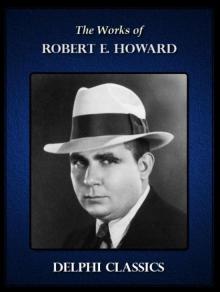 Delphi Works of Robert E. Howard (Illustrated) (Series Four)
Delphi Works of Robert E. Howard (Illustrated) (Series Four)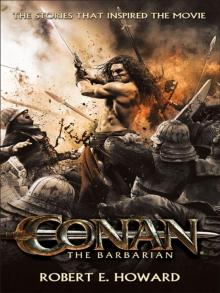 Conan the Barbarian: The Stories That Inspired the Movie
Conan the Barbarian: The Stories That Inspired the Movie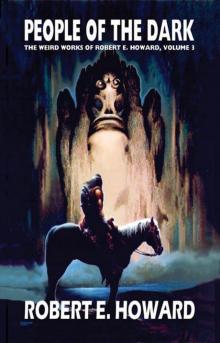 People of the Dark Robert Ervin Howard
People of the Dark Robert Ervin Howard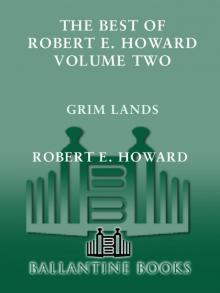 Grim Lands
Grim Lands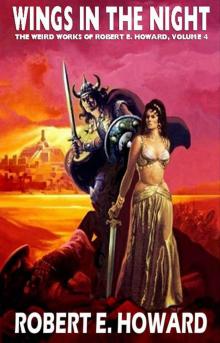 Wings in the Night
Wings in the Night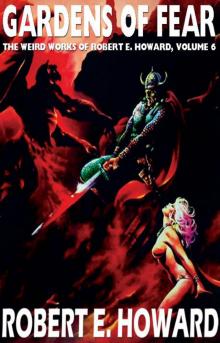 Gardens of Fear
Gardens of Fear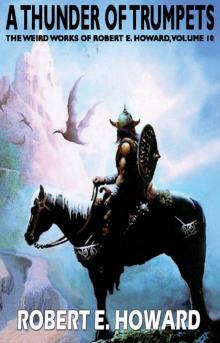 A Thunder of Trumpets
A Thunder of Trumpets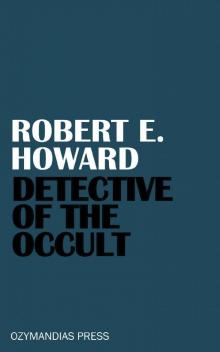 Detective of the Occult
Detective of the Occult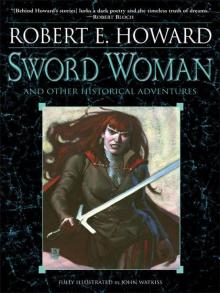 Sword Woman and Other Historical Adventures
Sword Woman and Other Historical Adventures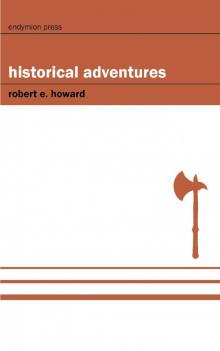 Historical Adventures
Historical Adventures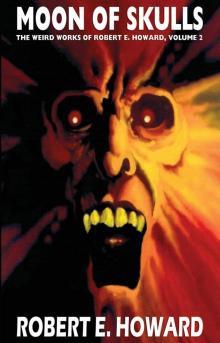 Moon of Skulls
Moon of Skulls The Robert E. Howard Omnibus: 97 Collected Stories
The Robert E. Howard Omnibus: 97 Collected Stories The Pirate Story Megapack: 25 Classic and Modern Tales
The Pirate Story Megapack: 25 Classic and Modern Tales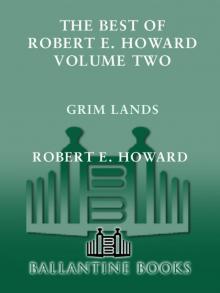 The Best of Robert E. Howard, Volume 2
The Best of Robert E. Howard, Volume 2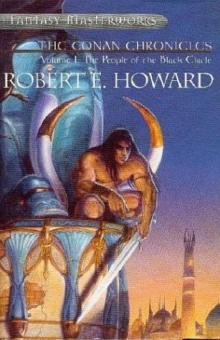 The Conan Chronicles, Vol. 1: The People of the Black Circle
The Conan Chronicles, Vol. 1: The People of the Black Circle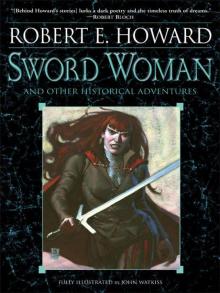 Sword Woman and Other Historical Adventures M
Sword Woman and Other Historical Adventures M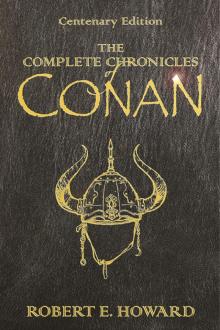 The Complete Chronicles of Conan
The Complete Chronicles of Conan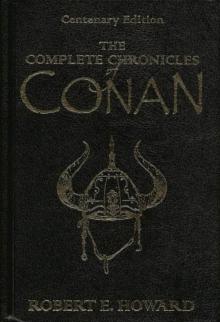 Conan the Barbarian: The Chronicles of Conan (collected short stories)
Conan the Barbarian: The Chronicles of Conan (collected short stories)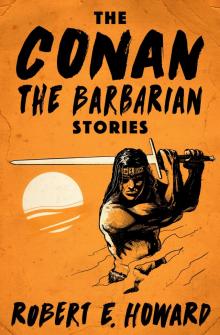 The Conan the Barbarian Stories
The Conan the Barbarian Stories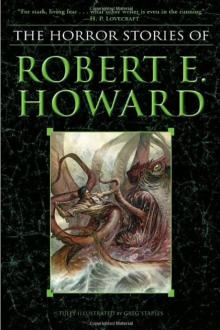 The Best Horror Stories of
The Best Horror Stories of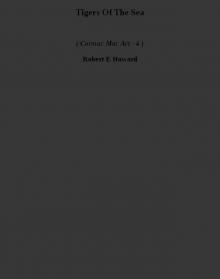 Tigers Of The Sea cma-4
Tigers Of The Sea cma-4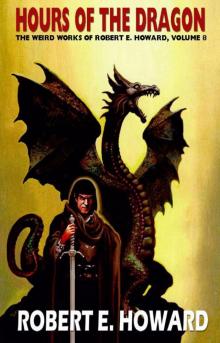 The Hours of the Dragon
The Hours of the Dragon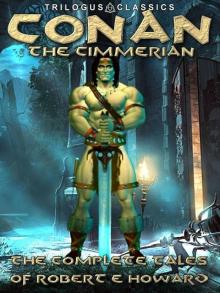 Conan the Cimmerian: The Complete Tales (Trilogus Classics)
Conan the Cimmerian: The Complete Tales (Trilogus Classics)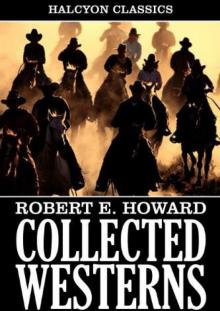 Collected Western Stories of Robert E. Howard (Unexpurgated Edition) (Halcyon Classics)
Collected Western Stories of Robert E. Howard (Unexpurgated Edition) (Halcyon Classics)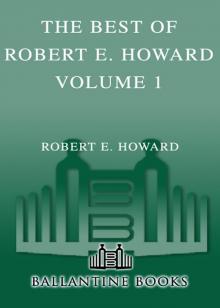 The Best of Robert E. Howard, Volume 1
The Best of Robert E. Howard, Volume 1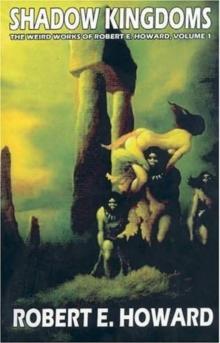 Shadow Kingdoms
Shadow Kingdoms